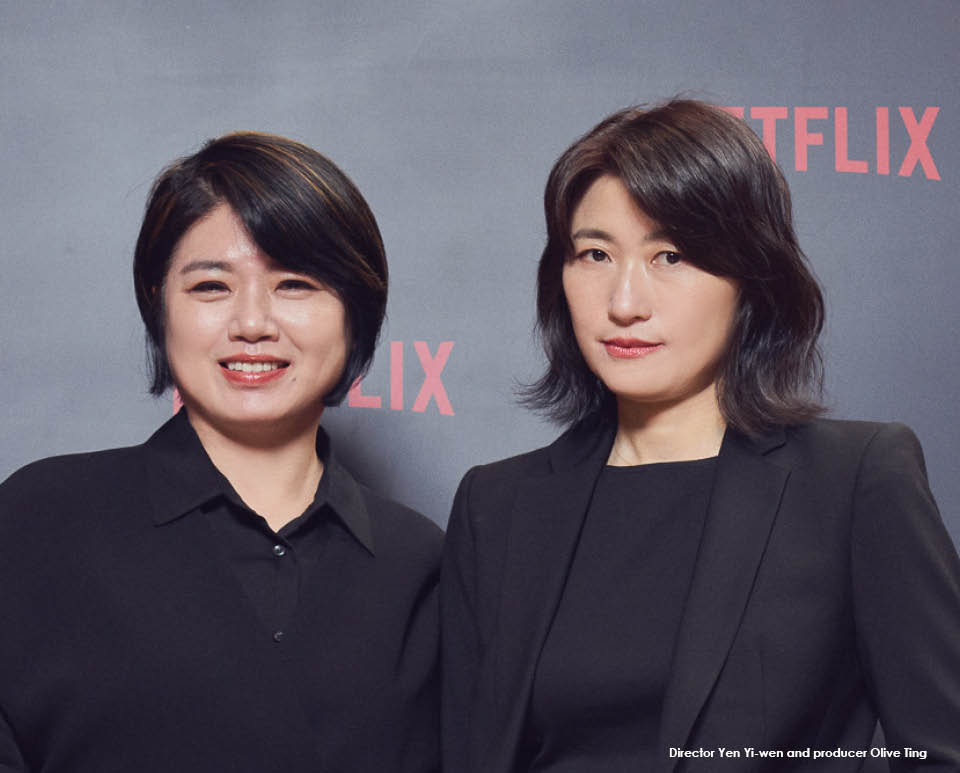
The creative duo behind “Born for the Spotlight” say recognition of women and opportunities are expanding in Taiwan’s TV Scene. Patrick Frater spoke to the Netflix series’ director, Yen Yi-wen, and producer, Olive Ting.
"Born for the Spotlight", a 12-part Taiwan drama series that premiered in November and shot immediately to Netflix’s #1 show in the country, is an entertaining tangle of aspirations, over-inflated egos and bitchy barbs framed in a narrative about women seeking careers in the TV business.
The show’s multiple characters – who include a naïve newcomer and an experienced talent agent crudely named Ms. Chubby – seem to risk almost daily heartbreak as they navigate (or choose to avoid) a greedy and unforgiving industry.
Central to the story are a retired star known for her beauty, but who is now indulging in binge drinking and casual sex hook-ups, and her former best friend whose ascendant producing career threatens to overtake that of her once successful director-husband.
If the themes sound familiar, retro or stereotypical, the show’s director Yen Yi-wen says most of the elements are absolutely real. “Some of the storylines come from my lived experiences, some are the contributions of other actresses,” Yen says. “I discovered that we share many frustrations and anxieties.”
Yen has been working as an actress for some 20 years and, after two previous nominations, won a Golden Bell Award in 2015 for "Angel’s Voice Recorder". “Finally, I’d got the recognition that I’d sought. But the next morning I had to return to another set and participate in a mediocre story. I felt not only helpless and hopeless, but also that I wasn’t doing justice to myself or to the audience,” Yen says.
“That same day, after I’d finished work, I returned home and cried. Then I turned on the computer and started to write a ridiculous story about an actress who gets an award, but whose hair starts to fall out immediately after, who gets allergies and has other mishaps, but still can’t cry about it,” she says.
In the intervening years, Yen co-wrote and co-directed family drama series, "The Making of an Ordinary Woman", which released in 2...
The creative duo behind “Born for the Spotlight” say recognition of women and opportunities are expanding in Taiwan’s TV Scene. Patrick Frater spoke to the Netflix series’ director, Yen Yi-wen, and producer, Olive Ting.
"Born for the Spotlight", a 12-part Taiwan drama series that premiered in November and shot immediately to Netflix’s #1 show in the country, is an entertaining tangle of aspirations, over-inflated egos and bitchy barbs framed in a narrative about women seeking careers in the TV business.
The show’s multiple characters – who include a naïve newcomer and an experienced talent agent crudely named Ms. Chubby – seem to risk almost daily heartbreak as they navigate (or choose to avoid) a greedy and unforgiving industry.
Central to the story are a retired star known for her beauty, but who is now indulging in binge drinking and casual sex hook-ups, and her former best friend whose ascendant producing career threatens to overtake that of her once successful director-husband.
If the themes sound familiar, retro or stereotypical, the show’s director Yen Yi-wen says most of the elements are absolutely real. “Some of the storylines come from my lived experiences, some are the contributions of other actresses,” Yen says. “I discovered that we share many frustrations and anxieties.”
Yen has been working as an actress for some 20 years and, after two previous nominations, won a Golden Bell Award in 2015 for "Angel’s Voice Recorder". “Finally, I’d got the recognition that I’d sought. But the next morning I had to return to another set and participate in a mediocre story. I felt not only helpless and hopeless, but also that I wasn’t doing justice to myself or to the audience,” Yen says.
“That same day, after I’d finished work, I returned home and cried. Then I turned on the computer and started to write a ridiculous story about an actress who gets an award, but whose hair starts to fall out immediately after, who gets allergies and has other mishaps, but still can’t cry about it,” she says.
In the intervening years, Yen co-wrote and co-directed family drama series, "The Making of an Ordinary Woman", which released in 2019. But the memory of that post-award depression appears to have stuck with her through to the much larger Born for the Spotlight. In the glossy new show, only A-listers are allowed to cry.
Significantly, "Born for the Spotlight" is created and enabled by women. The series’ producer is Olive Ting ("Secrets in the Hot Spring") and it was greenlit at Netflix, where the head of Chinese-language content is Maya Huang, a Taiwan-based screenwriter-turned-commissioner.
The involvement of international streaming platforms in the Taiwan production scene has helped women creators shift to what Ting calls “a new paradigm”.
“In the past, in Taiwan, if you wanted to get a green light from distributors or television companies, you’d have to pitch a romance story. The streamers are open to different ideas and we are not faced with the same group of decision makers,” Ting says.
“That’s why we are now seeing shows like "The Making of an Ordinary Woman" or "Wave Makers" happening. [Streamers] also have more abundant financial resources, so we can be more ambitious and bolder in the writing process.”
"Wave Makers" was a 2023 Koko Entertainment series for Netflix that was set in the milieu of election workers. It touched on multiple themes, including Taiwan’s robust democracy, women politicians, ethnic minorities and capital punishment, but will especially be associated with its through-line of workplace sexual harassment. Several commentators have credited the show with invigorating Taiwan’s real-world #MeToo movement, provoking a round of public allegations and causing a grovelling apology to women from the ruling Democratic Progressive Party.
The targets in "Born for the Spotlight" are less elevated than a presidential election race, but they are probably more immediately relevant to a greater number of viewers. There is a painfully frustrating scene in the show’s first episode where several mid-level executives are casually discussing casting options. Again, Yen says she based this on lived experience.
“Everyone in the meeting is eating their lunch. Or having fun. Certainly, not paying attention or relating to the real lives they are dealing with,” says Yen. “It is simply not respectful.”
But on these lines, Yen and Ting again say that change is afoot. “Ageism and sexism are not as prevalent as in the past when there was more emphasis on romance stories and every discussion would prioritise appearance over performance,” says Yen. “Now that we have a wider range of genres there’s more diversity. And you can be an actor in Taiwan even if you don’t have the perfect look or body shape.”
Yen says that the show’s pace and comedy help make social messaging more digestible.
“If I looked at this show only from an actress’s perspective I’d feel that some parts are very brutal. But as a writer and director, I can see the bigger picture. I can transform those stories and use humour to get a bigger message across.”



















